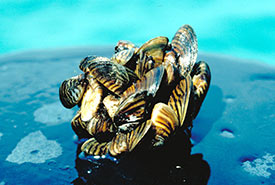
Zebra mussel (Photo by U.S. Environmental Protection Agency)
Zebra mussel
What does it look like?
Zebra mussels are freshwater mussels measuring around 2.5 centimetres long on average, but can grow up to four centimetres. They are named for the dark, striped pattern on their sharp shell.
Where does it live?
Zebra mussels are an invasive species that has spread from their native Black Sea region of eastern Europe and western Asia waters to Canada. They can be found throughout all of the Great Lakes, Lake St. Clair (between Michigan and Ontario) and the Mississippi River watershed. This pesky species was first observed in 1988 in Ontario, and they have now made their way into Lake Winnipeg.
How has this invasive species impacted habitats?
Zebra mussels are highly adaptable and can survive in a variety of water temperatures and conditions. A single female zebra mussel can produce up to a million eggs per year. As the eggs are free-floating, they are picked up by water currents, winds and waves and can quickly spread in large numbers through the water. A few weeks later, after the eggs are released and as the larvae develop, they secrete sticky fibres to attach themselves to any hard surface within the water.
Zebra mussels negatively impact habitats by filtering water, which removes plankton from the water. Plankton is the foundation of many food chains, including those of native fish and wildlife. A single zebra mussel can filter up to one litre of water a day. As a result, the decreased levels of plankton in the water upset the balance of food chains in ecosystems. Also, clearer water as a result of filtering allows sunlight to easily penetrate and warm up the water. This causes an increase in aquatic vegetation and algal growth.
How can you help reduce the spread of this species?
To avoid the spread of zebra mussels, people should take precautions. Boaters should inspect any aquatic equipment for zebra mussels and wash the equipment down before using it in another body of water. Zebra mussel sightings in Ontario can be reported to the Invading Species Awareness Program.
Stopping the spread of invasive species like zebra mussels helps native species to flourish and landscapes to thrive.




